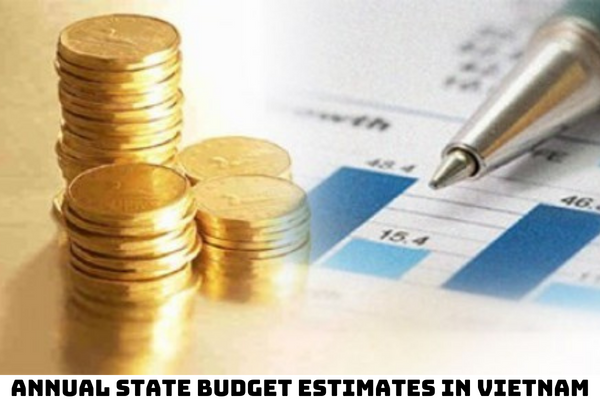Vietnam: What is the basis for making annual state budget estimates? What are the requirements for making annual state budget estimates?
What is the basis for making annual state budget estimates in Vietnam?
According to Article 41 of the 2015 Law on State Budget, basis for making annual state budget estimates includes:
- Socio-economic development, national defense, security, diplomatic objectives, and gender equality.
- Specific objectives of Ministries, ministerial agencies, Governmental agencies, other central regulatory agencies, local agencies, organizations and units.
- Regulations of law on taxes, fees, charges, and regulations on collection of state budget revenues; norms of budget allocation; policies, standards, limits on state budget expenditure.
- Distribution of revenue sources and obligatory expenditures; ratio of revenue distribution and level of additional funding for budget balancing from superior budget to inferior budget.
- Legislative documents promulgated by competent authorities on guidelines for formulation of socio-economic development plans and making of next year’s state budget estimate.
- 5-year financial plans, -year state budget – finance plans, and plans for midterm investment of the state budget.
- Last year’s enactment of the state budget.
- Checked estimate of budget revenue and expenditure notified to relevant agencies, organizations, and individuals.
Thus, the competent authority will base on the above-mentioned basis to make annual state budget estimates.

What are the requirements for making annual state budget estimates in Vietnam?
Pursuant to Article 42 of the 2015 Law on State Budget as follows:
Requirements applied to annual state budget estimates
1. State budget estimates must be sorted by revenue, expenditure, ratio of expenditure on development investment, recurrent expenditure, expenditure on national reserve, repayment of loans and aid, additional contribution to financial reserve funds, and budget reserve.
2. Budget estimates of budget estimate units at various levels must contain all revenues and expenditures in accordance with the form and schedule prescribed by competent authorities. The budget estimate contains:
a) Budget revenue estimate based on forecast about macroeconomic indicators and relevant criteria, regulations of law on taxes, fees, charges, and collection of budget revenues;
b) Estimate of expenditure on development investment based on planning, plans, programs/projects approved by competent authorities; 5-year financial plans, plans for midterm investment of state budget, ability to balance resources in the budget year, regulations of law on public investment, construction, and relevant regulations of law;
c) Estimate of recurrent expenditures based on given tasks and objectives approved by competent authorities, policies, standards, and limits on expenditures imposed by competent authorities. Regulations of the government shall apply to budget estimates made by regulatory agencies exercising financial autonomy; public service agencies exercising autonomy in terms of task performance, organizational structure, personnel, and finance;
d) Estimate of budget expenditure on education, vocational training, science and technology at the ratio prescribed by relevant regulations of law.
dd) Estimate of expenditures on execution of National target programs based on the list of programs and total expenditure in each period decided by the National Assembly; targets, contents, objectives, and details of component projects of each National target program;
e) Estimate of expenditure on repayment of debts that are due in the budget year;
g) Estimate of loans for covering state budget deficit based on state budget balance, capacity of each source, solvency, and safety limits under the National Assembly’s Resolution.
According to the above provisions, when making annual state budget estimates, competent authorities must ensure the following requirements:
- State budget estimates must be sorted by revenue, expenditure
- State budget estimates must be sorted by the ratio of expenditure on development investment, recurrent expenditure, expenditure on national reserve, repayment of loans and aid, additional contribution to financial reserve funds, and budget reserve.
What are the responsibilities of agencies and organizations when making annual state budget estimates in Vietnam?
Pursuant to Article 45 of the 2015 Law on State Budget, the responsibilities of agencies and units when making annual state budget estimates are as follows:
- Local collecting authorities shall make estimates of local state budget revenues and send them to the superior collecting authority and the finance authority at the same level. Central collecting authorities shall make estimates of state budget revenues of their fields and send them to the Ministry of Finance for aggregation and making of the state budget estimate.
- Agencies, organizations, units, and investors shall make estimates of their budget revenue and expenditure within the area of their obligations, and send reports to superior regulatory agencies for aggregation and reporting to the finance authority at the same level.
- Local finance authorities shall examine budget estimates of agencies, organizations and units at the same level; take charge and cooperate with relevant agencies in aggregating, estimating, and allocating their budgets in accordance with Clause 1 and Clause 2 Article 30 of this Law, then submit a report to the People’s Committee at the same level.
- The People’s Committees shall consolidate, make local government budget estimates, and submit a report to the Standing Committee of the People’s Council at the same level for opinions. The People’s Committees of provinces shall send the Ministry of Finance, the Ministry of Planning and Investment, and relevant agencies their budget estimates in order to make the state budget estimate to be submitted to the government and Members of the National Assembly for monitoring.
- Central and local specialized regulatory agencies shall cooperate with finance authorities, planning and investment authorities at the same level in making state budget estimates of their fields.
- The Ministry of Finance shall examine budget estimates of Ministries, ministerial agencies, Governmental agencies, other central and local regulatory agencies; take charge and cooperate with the Ministry of Planning and Investment, relevant Ministries and agencies in aggregating, estimating state budget and planning allocation of central government budget, then submit a report to the government in accordance with Clause 1 Article 47 of this Law.
LawNet
